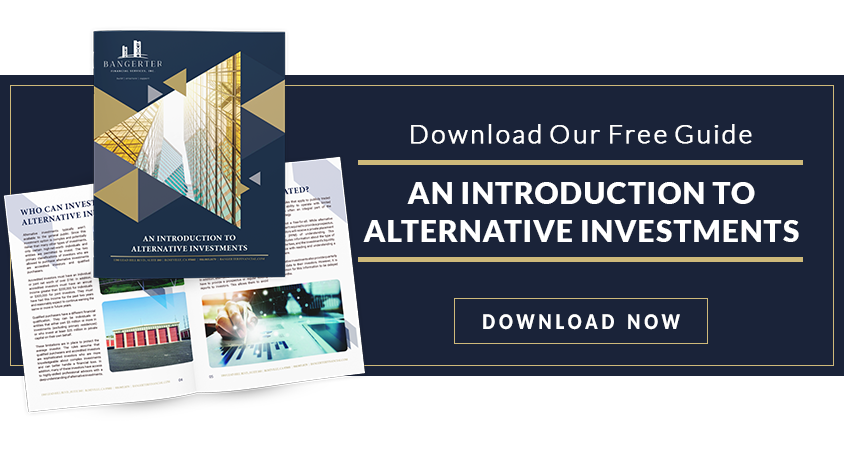Alternative investments1 have been a recognized asset class for a long time, but recent volatility in the global stock markets has increased the attention on alternatives as a way to diversify portfolios and to potentially increase returns during periods of stress for more traditional investments including equities, fixed-income and cash.
However, as with any investment class, alternatives are not for everyone. That’s why it is important to understand all you can about how to invest before you get started. First let’s look at a few common ways that investors who qualify can participate in alternative investments, and then we will discuss who can invest.
Private Equity2
Private equity investments are literally just that, investments made into private companies or those not listed on a public exchange. For example, you’ve no doubt heard of venture capital, which is one form of private equity investment providing capital to a company that is in the early stages of development but is thought to have significant growth potential. If the company succeeds, investors may enjoy a high return on their investment, but many companies don’t yet have a proven track record, so the risk may also be higher.
In many cases, private equity investments require investors to put up capital without knowing which companies they’re investing in and for extended periods of time without access to their capital.
Private Debt
Think of private debt as a private loan that is not financed by a bank or traded on the open market. Whenever both private and public companies need an infusion of capital to fund their growth, it can be provided through private debt funds, which make money by collecting interest payments and receiving repayment of the original loan principal.
Hedge Funds3
Hedge funds are often used for diversification4, as they tend to do well when more
traditional assets decline. While hedge funds generally trade relatively liquid assets, hedge fund strategies are usually considered illiquid and require extended holding periods for investors. Hedge fund managers use a variety of complex trading strategies to achieve a higher return on investment.
Commercial Real Estate5
While direct ownership of commercial real estate properties is often out of reach for most investors, it is possible. One popular option is to purchase a fractional interest in commercial properties through a Delaware Statutory Trust (DST). The DST is a great way for investors who are using a 1031 exchange to sell an investment property and reinvest in a variety of institutional-quality properties that can include multifamily, industrial, retail, and other types.
Commodities6
Investors often purchase commodities as a hedge against inflation since they’re not as sensitive to equity markets. Here we are specifically speaking to natural resource investments, which include corn, coffee, soybeans, crude oil, timber, natural gas, and precious and industrial metals like silver and copper. Commodity trades are made on the futures market and through certain ETFs7.
Who Can Invest?
Alternative assets are generally not available to the general public, and for good reason. Since this investment option is complex and potentially riskier than many others, only certain high-net-worth individuals and entities are permitted to invest. The two primary classes of investors who are allowed to purchase alternative investments are accredited investors and qualified purchasers. There are specific and strict rules who qualifies in each of these classes.
Accredited investors must have an individual or joint net worth of over $1 million. Also, accredited investors must have an annual income greater than $200,000 for individuals or $300,000 for joint investors. They must have had this income for the past two years and reasonably expect to continue earning the same or more in future years.
Qualified purchasers have a different financial qualification, and can be individuals or entities that either own $5 million or more in investments (excluding primary residences) or who invest at least $25 million in private capital on their own behalf.
These limitations are important and are designed to protect the average investor. The rules assume that accredited investors and qualified purchasers are sophisticated investors who are more knowledgeable about complex investments and can better handle a financial loss. Also, these investor classes are more likely to have access to professional advisors who have a deep understanding of alternative investments and their suitability.
If you're unsure about your status as an accredited investor, just complete this handy form to find out.
Qualified Accredited Investors who are a member of the Bangerter Accredited Investor Community have access to special events and alternative investment opportunities not available to the general public:
- 1031 Exchange/DSTs
- Securitized Real Estate
- Strategies & Investments to Help Reduce8 Income Taxes9
- Opportunity Zones
- Advanced Estate Planning9
To be considered for our Accredited Investor Community, you must qualify under at least one of the following:
- As an individual, have an annual income and net worth of $200,000.
- With a spouse, have an annual income and net worth of $300,000 in each of the two most recent years, with an expectation of reaching the same income level in the current year.
- Either individually or jointly with a spouse, have a net worth of $1 million, excluding the positive equity in such person’s primary residence.
- Be a private business development company or an organization with assets exceeding $5 million; or if an entity consists of equity owners who are accredited investors, the entity itself is an accredited investor provided the organization was not formed with a sole purpose of purchasing specific securities.
Now that you know a few ways to invest in alternative investments, we invite you to contact a Bangerter professional for more information about the benefits of this investment class and how it can help accredited and qualified investors build diversified portfolios.
This is for informational purposes only and does not constitute individual investment advice.
1. Investing in alternative assets involves higher risks than traditional investments and is suitable only for sophisticated investors. Alternative investments are often sold by prospectus that discloses all risks, fees, and expenses. They are not tax efficient and an investor should consult with his/her tax advisor prior to investing. Alternative investments have higher fees than traditional investments and they may also be highly leveraged and engage in speculative investment techniques, which can magnify the potential for investment loss or gain and should not be deemed a complete investment program. The value of the investment may fall as well as rise and investors may get back less than they invested.
2. Private placements are high risk and illiquid investments. As with other investments, you can lose some or all of your investment. Nothing here should be interpreted to state or imply that past results are an indication of future performance nor should it be interpreted that FINRA, the SEC or any other securities regulator approves of any of these securities. Additionally, there are no warranties expressed or implied as to accuracy, completeness, or results obtained from any information provided here. Investing in private securities transactions bears risk, in part due to the following factors: there is no secondary market for the securities; there is credit risk; where there is collateral as security for the investment, its value may be impaired if it is sold. Please see the Private Placement Memorandum (PPM) for a more detailed explanation of expenses and risks.
3. Hedge Funds are unregistered private investment partnerships, funds or pools that may invest and trade in many different markets, strategies and instruments (including securities, non-securities and derivatives) and are NOT subject to the same regulatory requirements as mutual funds, including mutual fund requirements to provide certain periodic and standardized pricing and valuation information to investors. Hedge Funds represent speculative investments and involve a high degree of risk. An investor could lose all or a substantial portion of his/her investment. Investors must have the financial ability, sophistication/experience and willingness to bear the risks of an investment.
4. Diversification does not guarantee a profit or protect against a loss in a declining market. It is a method used to help manage investment risk.
5. There are material risks associated with investing in DST properties and real estate securities including liquidity, tenant vacancies, general market conditions and competition, lack of operating history, interest rate risks, the risk of new supply coming to market and softening rental rates, general risks of owning/operating commercial and multifamily properties, short term leases associated with multi-family properties, financing risks, potential adverse tax consequences, general economic risks, development risks, long hold periods, and potential loss of the entire investment principal. Past performance is not a guarantee of future results. Potential cash flow, returns and appreciation are not guaranteed. IRC Section 1031 is a complex tax concept; consult your legal or tax professional regarding the specifics of your particular situation. This is not a solicitation or an offer to sell any securities. DST 1031 properties are only available to accredited investors (typically have a $1 million net worth excluding primary residence or $200,000 income individually/$300,000 jointly of the last three years) and accredited entities only. If you are unsure if you are an accredited investor and/or an accredited entity please verify with your CPA and Attorney.
6. Investments in commodities may have greater volatility than investments in traditional securities, particularly if the instruments involve leverage. The value of commodity-linked derivative instruments may be affected by changes in overall market movements, commodity index volatility, changes in interest rates or factors affecting a particular industry or commodity, such as drought, floods, weather, livestock disease, embargoes, tariffs and international economic, political and regulatory developments. Use of leveraged commodity-linked derivatives creates an opportunity for increased return but, at the same time, creates the possibility for greater loss.
7. Exchange Traded Funds (ETF’s) are sold by prospectus. Please consider the investment objectives, risks, charges, and expenses carefully before investing. The prospectus, which contains this and other information about the investment company, can be obtained from the Fund Company or your financial professional. Be sure to read the prospectus carefully before deciding whether to invest.
8. Pursuant to requirements imposed by the Internal Revenue Service, any tax advice contained in this communication (including any attachments) is not intended to be used, and cannot be used, for purposes of avoiding penalties imposed under the United States Internal Revenue Code or promoting, marketing or recommending to another person any tax-related matter. Please contact us if you wish to have formal written advice on this matter.
9. Bangerter Financial does not offer legal or tax advice. Please consult the appropriate professional regarding your individual circumstance.
Investment advisory services offered through Bangerter Financial Services, Inc. A state Registered Investment Advisor. Registered Representative and securities offered through Concorde Investment Services, Inc. (CIS), member FINRA/SIPC. Bangerter Financial Services, Inc. is independent of CIS.





.png?width=273&height=103&name=Brokercheck%20(1).png)

Comments